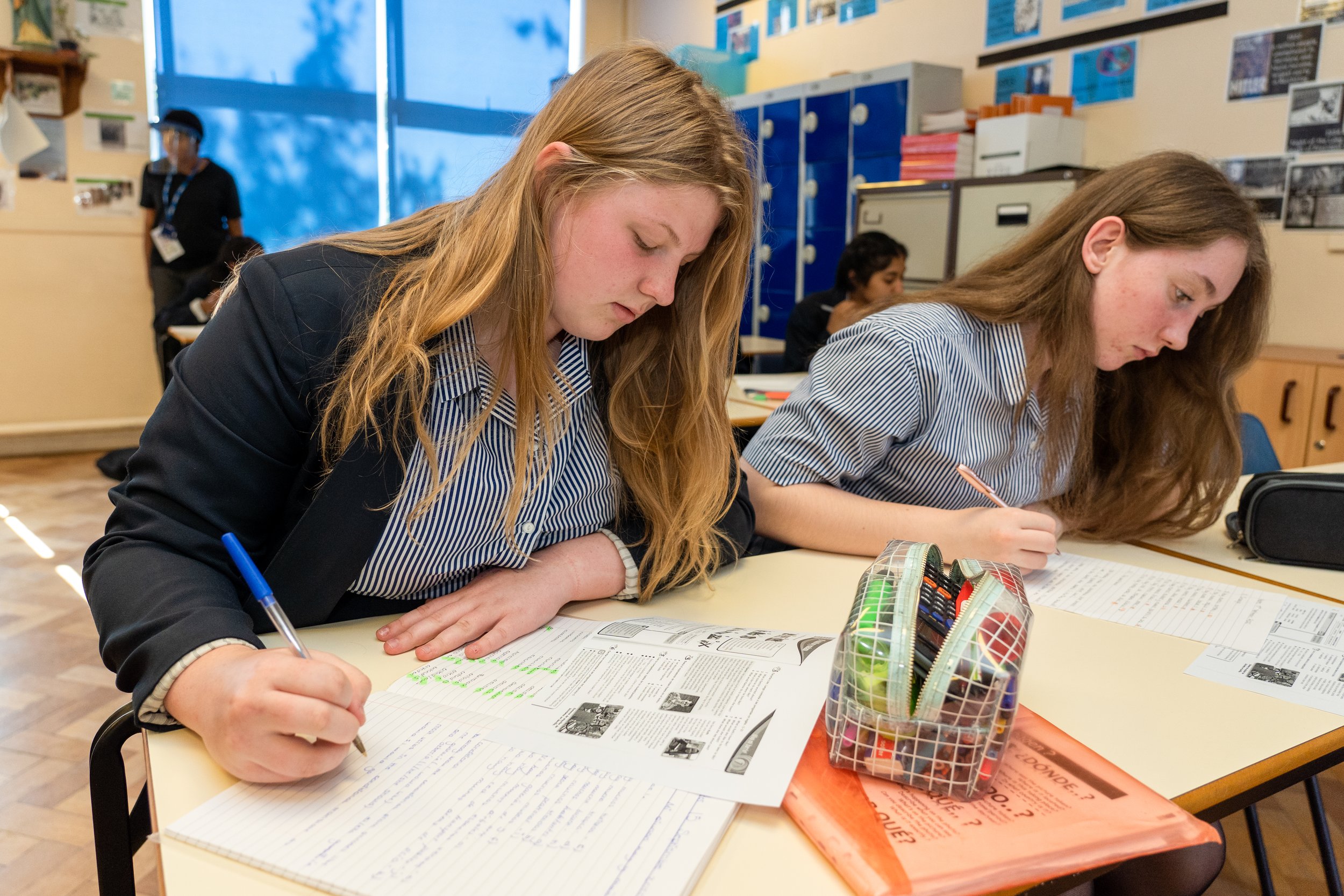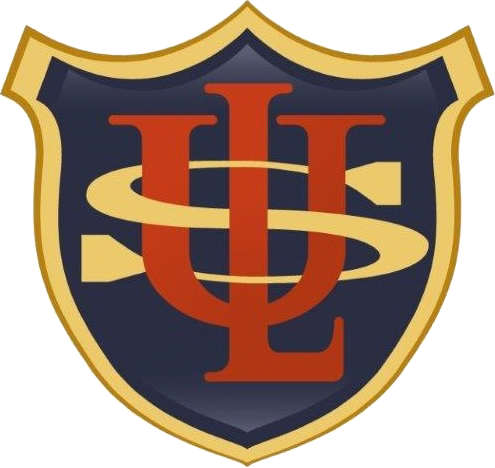
ENGLISH
Overview Of The Subject
In studying English students develop skills in speaking, listening, reading and writing that they will need to participate in society and employment. Students learn to express themselves creatively and imaginatively. They also learn to communicate with others confidently and effectively. Girls will learn to be critical readers of stories, poetry and drama as well as non-fiction and media texts. By studying the patterns and conventions of English, students will be able to choose and adapt what they say and write in different situations.
Aims Of The Curriculum/Curriculum Intent
Our Key Stage 3 curriculum builds on the knowledge learnt at Key stage 2. We have analysed the knowledge and skills learnt in Year 6 and across their primary education, and those required for GCSE and beyond, so that our broad programme of study in English builds on and prepares pupils for the next stage of their education, training and employment, whilst also building their confidence in all areas of English study.
Pupils follow schemes of work designed to teach the Framework Objectives of the revised National Curriculum at K.S3. Pupils are tested in ‘baseline’ tests at the start of Year 7 to establish the most appropriate set for their ability range. Pupils are taught in one of five teaching groups. Their place in a set is kept under review. Half-termly assessments allow teachers to monitor progress of students, tailor their teaching to students’ needs, and move pupils between groups where required. In Year 7, 8 and 9, pupils are banded 1 – 9 based on their proficiency in a range of skills in reading, writing and speaking and listening and sit end of year exams in English Literature and English Language.
Each lesson at Key Stage 3 builds upon reading skills with silent reading, and progress across the key stage in this essential skill is tracked and developed through the Renaissance Reading software. Pupils quiz regularly to improve their reading age and vocabulary development. All pupils have a library lesson each fortnight in which they choose fiction to read. Their reading is monitored and reviewed using the Renaissance Learning Accelerated Reading Program and they read independently at home.
Pupils who need additional support in English are identified at Progress Checks which take place routinely across the year. Small group intervention, consisting of a ten-week programme of intervention lessons, is put in place for students in need of additional support outside of English lessons.
Curriculum Content KS3
Year 7
Students will begin Year 7 with a unit on the life, times and works of Charles Dickens. In the spring term, they will study the History of the English Language and extracts from Chaucer's Canterbury Tales, encouraging a broader understanding how the English Language has changed and evolved over time. Students will additionally analyse a range of poetry through time and place, developing their repertoire of poetic devices and how writers craft their writing for particular effect. Finally, in the last part of the summer term they will cover a unit introducing Media with a focus on newspapers and magazines.
Year 8
The year begins with the study of ‘Animal Farm’, with a close study of developing characters and themes as students develop their critical analysis skills of whole texts. In the second part of the Autumn Term, students will read and analyse war poetry and write an imaginative piece chronicling the life of a soldier away at war. They will study a novel and poetry on the theme of mystery and imagination and will be given opportunities to develop their descriptive abilities through creative writing tasks. In the summer term, students will study a range of extracts around the theme of ‘Identity and Self’ and have the opportunity to explore their own ‘identity and self’ through their writing. Year 8 will conclude with the Shakespeare play, ‘A Midsummer Night’s Dream’ providing opportunities for performance related assessments.
Year 9
The year begin with studying the Shakespearean play ‘Macbeth’ granting occasions for developing long essay style responses in preparation for the GCSE. In the spring term, students will study a collection of poetry from other cultures and have the opportunity to write their own poetry and perform recitals. In the summer term, they will study a range of literary non-fiction and begin studying the GCSE text 'An Inspector Calls'.
English KS4
Aims Of The Curriculum/Curriculum Intent
Pupils follow schemes of work designed to teach the new Pearson specifications English Language and English Literature. Pupils’ notes or written tasks are kept by the pupils themselves. The work of pupils is marked and regular feedback is given in the form of written advice and GCSE grades. Half-termly assessments take the form of exam practice papers which are to be completed under timed conditions in exam conditions. The results of these, along with work throughout the term provide guidance for teachers when completing pupil progress checks. Pupils are taught in one of five ability groups.
Specification
Pearson.
Curriculum Content KS4
English Language
Fiction And Imaginative Writing
Pupils will study and analyse selections from a range of prose fiction and develop skills to analyse and evaluate 19th-century fiction extracts. They will develop imaginative writing skills to engage the reader and will be required to use spelling, punctuation and grammar accurately.
Non-Fiction And Transactional Writing
Pupils will study and analyse selections from a range of non-fiction texts (including literary non-fiction). They will also develop their writing skills for a particular audience and purpose exploring transactional writing skills, for example letters, articles, reports.
Spoken Language
The preparation and assessment of spoken language is a compulsory requirement of the course of study. It will appear on all students’ certificates as a separately reported grade, alongside the overall grade issued. The criteria will address the following assessment objectives:
Demonstrate presentation skills in a formal setting
Listen and respond appropriately to spoken language, including to questions and feedback to presentations
Use spoken Standard English effectively in speeches and presentations
English Literature
The aims and objectives of GCSE English Literature are to enable students to encourage students to read a wide range of classic literature fluently and with good understanding and make connections across their reading. Students will be taught to read in depth, critically and evaluatively, so that they are able to discuss and explain their understanding and ideas. Students will develop the habit of reading widely and appreciate the depth and power of the English literary heritage. Over the course, students will be taught to write accurately, effectively and analytically about their reading, using Standard English and a wide vocabulary, including grammatical terminology, and other literary and linguistic terms.
Year 10
Students will study a range of literature including: a collection of poetry from the GCSE Edexcel anthology, ‘Dr Jekyll and Mr Hyde’ and finally ‘Romeo and Juliet’ developing the skills to analyse how the language, form, structure and context of texts can create meanings and effects. They will also study a variety of prose fiction and develop the skills to analyse and evaluate 19th century fiction texts. As part of the English Language exams, pupils will develop imaginative writing skills to engage the reader. Extracts from 20th and 21st century non-fiction texts will be analysed, evaluated and compared and students will have opportunity to practise responding to exam style questions in preparation for the final GCSE exams.
Year 11
Revision of all of the set texts in preparation for the mock exams as well as further opportunities to practise and develop the skills required for the examination will take place in the Autumn Term. Pupils will also complete their Speaking and Listening Exam in the first term of Year 11.
Additional Educational Activities
The ‘Renaissance Learning’ program is available for pupils to use both in library lessons and in their own time. The school takes part in the Jack Petchey ‘Speak Out’ challenge and ‘The Rotary Youth Speaks’ competition. Pupils will have the opportunity to see theatre performances of set texts such as ‘A Midsummer Night’s Dream’ in Year 8, ‘Macbeth’ in Year 9 and ‘Romeo and Juliet’ in Year 10. In KS3 a number of House Events will be run by the English Department: Year 8 pupils will put together a number of performances based on ‘A Midsummer Night’s Dream’, writing competitions are run regularly throughout the year and in the Summer Term pupils all KS3 will have the opportunity to enter the school writing competition.
Whilst English is a vital skill required at all levels of further study, it also opens the doors to a variety of careers, including journalism, media, publishing and advertising amongst others.
